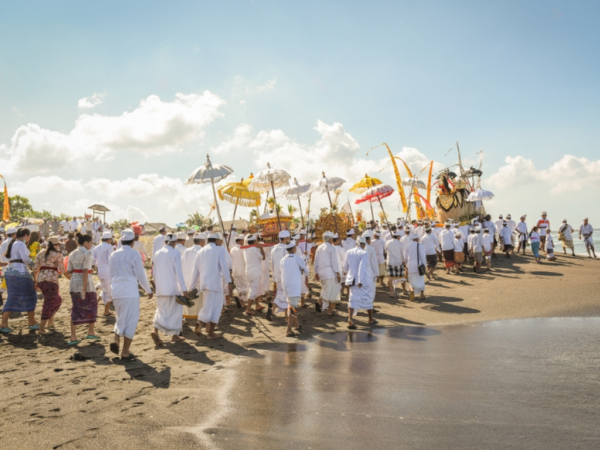Bali, known as the “Island of the Gods,” is renowned for its rich cultural heritage and spiritual practices. One of the most significant and vibrant ceremonies in Bali is the Melasti ceremony. This ancient purification ritual is performed by Balinese Hindus to cleanse the world from evil and prepare for the upcoming Nyepi (Day of Silence). In this article, we will delve into the significance, rituals, and experiences of the Melasti ceremony in Bali.
Understanding the Significance of Melasti
The Melasti ceremony is a purification ritual that takes place a few days before Nyepi, which marks the Balinese New Year according to the Saka calendar. The primary purpose of this ceremony is to cleanse both the human soul and the natural world from impurities, sins, and negative energies accumulated over the past year. It is believed that by doing so, the participants and their surroundings are spiritually prepared to enter a new year with a clean slate.
Melasti is more than just a ritual; it is a profound expression of Balinese Hinduism’s deep connection to nature and the belief in the importance of maintaining harmony between humans, the gods, and the environment. The ceremony is typically held near bodies of water such as the sea, rivers, or lakes, as water is considered a powerful purifying element in Hinduism.
The Rituals of the Melasti Ceremony
The Melasti ceremony is a highly structured event, steeped in tradition and symbolism. The rituals begin at the village temple, where sacred objects and statues representing the gods, known as Pratima, are taken out of the temple for a ceremonial procession. These objects are carried by devotees dressed in traditional Balinese attire, often accompanied by the sound of gamelan music and the chanting of sacred mantras.
The procession moves towards the nearest body of water, which could be a beach, river, or lake, depending on the location of the village. The journey itself is symbolic, representing the purification of the human soul as it moves from the mundane world to a sacred, purified state.
Once at the water, the sacred objects are washed and purified by the priests, who perform various rituals and prayers. The participants also cleanse themselves by splashing water on their bodies, symbolizing the washing away of sins and negative energies. The atmosphere during the Melasti ceremony is one of deep reverence, devotion, and communal harmony.
Experiencing the Melasti Ceremony in Bali
For visitors to Bali, witnessing the Melasti ceremony is an unforgettable experience. The ceremony is a beautiful display of Balinese culture and spirituality, offering a unique glimpse into the island’s deep-rooted traditions. The sight of hundreds of devotees, dressed in white and gold, carrying ornate offerings and sacred objects towards the sea, is a truly awe-inspiring sight.
While the Melasti ceremony is a sacred event primarily for the Balinese Hindu community, tourists are often welcomed to observe and respectfully participate in the rituals. However, it is important for visitors to dress modestly, behave respectfully, and follow the guidance of the local community when attending the ceremony.
When and Where to Witness the Melasti Ceremony
The Melasti ceremony takes place three to four days before Nyepi, which usually falls in March, although the exact date changes each year according to the Balinese Saka calendar. The ceremony is held in various locations across Bali, with some of the most popular spots being Sanur Beach, Kuta Beach, and Tanah Lot. Each location offers a unique experience, with different villages bringing their own customs and practices to the ceremony.
For those planning to attend, it is advisable to arrive early in the morning to secure a good spot to observe the rituals. The ceremony usually lasts several hours, so be prepared for a long but rewarding experience.
Last but not least, Melasti ceremony is a profound expression of Balinese spirituality and culture. It is a time of purification, reflection, and preparation for the new year. For both locals and visitors, participating in or witnessing the Melasti ceremony is a deeply enriching experience that offers insight into the harmonious relationship between the Balinese people, their gods, and the natural world.





